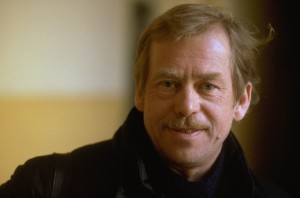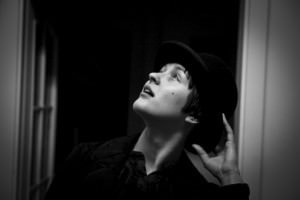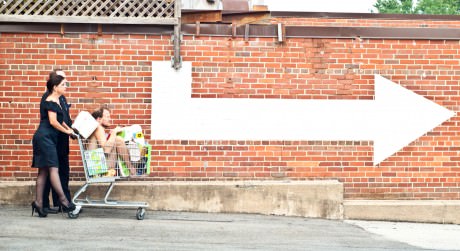Backstage in Preparation for The Václav Havel Project

Director Miřenka Čechová and Actress Susan Galbraith talk about their collaborative process and the themes and ideas they are wanting to explore in Antiwords (based on Audience) and Unveiling. The works are being performed on a double bill for two nights only as part of the Mutual Inspirations Festival – Václav Havel on September 24th and 25th at Atlas Performing Arts Center.
What about this rehearsal process is unique and surprising?

Susan: Plenty. But the first thing that got us to break the ice with each other and have some fun but also explore something very immediate and personal for us was a trip to the grocery store! It wasn’t what I thought we’d be tackling to approach a Vaclav Havel text, to be sure. But actor Larry Redmond, who plays my husband in Unveiling, and I found ourselves very much like our characters running up and down the aisles looking through all the choices to find just the right special ingredient to surprise and delight our other actor, who at that moment was left sitting in a shopping cart in the store’s parking lot! In the play, the third character is Vanek, a kind of alter-ego for Vaclav Havel, and this character became a very beloved character to Havel and to many Czechs, who saw in him the kind of “pathological politeness” and alienation that Havel was trying to communicate.
What is this experience of alienation in Vaclav Havel’s plays?

Miřenka: I can get maybe too academic about this, but I am fascinated about the connection between the people who were forced to live under the communist regime in my country in the time Vaclav Havel was writing these plays, and what I see happening to people who are forced to live in a capitalist society where material values and consumerism are considered as the preferred or usual lifestyle. So, we’re asking what is the general and universal experience of this so-called “alienation.”
Susan: In moments of the play, I call upon an experience of that uncomfortable awareness I had after growing up primarily in Asia then coming to the US, the country I was supposed to be from but hadn’t lived here much. It was an uncomfortable feeling that my own experiences weren’t valued or accepted, and an awareness that I didn’t fit in.
Miřenka: And it’s not only traveling to an unfamiliar culture? Haven’t you ever felt a foreigner inside of your own country? That somehow you speak a different language than others and that your values are so very different from those around you. I am also very curious to discover how some people bury their deepest and most personal part of themselves from themselves – that too is alienation. Where then is the hidden personal spirituality that I believe we all carry? Some people bring this spirituality no matter where they go. But some of us have to dig very deeply to discover it, because sometimes circumstances around us bury it.
What makes people happy in their lives? What makes people do good?
Miřenka: These two questions are very personal and important for Havel. The two characters in Unveiling, Michael and Vera, have created a nice environment, a “place with character,” and they believe they have a fulfilling life with a child and a fulfilling sexual life together. At some point, before the play starts, they have made the choice to fit in with the society around them to make life a little bit easier for themselves. Their old friend, Ferdinand Vanek, comes over to their apartment, and they want to show them the good life they have created.
Susan: And it’s their time of life too. We’ve talked about how Michael and Vera in the past were probably young, radical artists, who with Ferdinand Vanek were criticizing the society around them and “happy” united together in this. I am sure, as Vera, I saw myself fighting for values and individuality. I was part of a group of artists, exploring unabashedly with that relish that young people do, a kind of life on the edge, wanting to make different choices, to be free. There was also the thrill of danger.
Miřenka: Exactly, but you don’t have the power to live on the edge and seek danger all the time. Sometimes, as it is with your character, it’s better to give up your desires and dreams then to be all the time struggling. Maybe you got to the point that you felt you don’t have the strength inside to continue. And fighting against the power structure – then it was the system of communism that had the power. Here, it’s more illusive, and power lies in the whole system putting out the message that having more is better.
Susan: Speaking as my character, I have traded in what will make me happy. That’s where my anxiety comes in, because the more I go after what I think will make me happy, the more anxious and unhappy I am. But I’ve also been thinking about Havel and the documentary we have just seen about him at the Czech Embassy. He said that he was not interested in why people do evil; he was much more interested in why people do good. Vanek’s trying to “live in truth” certainly doesn’t make him popular with Vera and Michael. But he keeps trying. While Vera’s and Michael’s ideas about doing good have become all distorted.
Miřenka: And that’s how Havel uses a kind of theatre of absurd to show how this distortion becomes really funny, but also sometimes horrifying and very much part of the human experience.
And this touches on our process, so what are we discovering in this exploration of “authenticity?”
Miřenka: This is at the heart of all my work. We are always exploring our personal authenticity within these characters and within the play. As a performer, I have to relate this personal exploration to the character and my own questions and answers that are solved in the play. Then, when I come out on stage and stand up for the audience, I am really giving them some message that is very personal and important to me that comes from my own experience.
I believe this creates a special experience for the audience. I believe also that it’s important not to tell the audience everything. They have to fill in the meaning, creating and finishing the play. Maybe I prepare 70% or 80%, but I never want to explain everything to them. They have to be present and make a little effort. That way, theatre is not just entertainment but a place where they have to bring something of themselves. It necessitates what I would even call a spiritual involvement.
Susan: But you are having to do something with us in a few weeks what might in your culture and system take anywhere from three to nine months. So how has this changed what you do?
Miřenka: Truthfully, the actors have much less freedom with such a short amount of time to prepare. The director has a much bigger power. The director also has to know what he or she wants to achieve before the rehearsal starts. When you have extra time, you can explore what you want to achieve together, and the actors become co-creators or co-authors of the play that is happening. With only three or four weeks, the actors have to rely on the director much more. The director also must know how to lead the actors to the goal he she has in her head. But truthfully, I like to let the actors get lost. Why? Because it’s only in the moment that they don’t know where they are going and don’t rely on their techniques or tricks that they can find something new.
Susan: Yes, it’s very challenging. But what I love about this process is that because of your background in physical theatre and as a dancer, there are moments where the technical instructions give me a platform or internal structure on which I can build. And at other times, there is the permission to simply go in a direction I don’t know where I’m headed. It’s not about trying out a new intention. It’s not intentional at all.
Miřenka: That’s where the work becomes exciting for me. It’s working to the point of freeing the subconscious. You even have to erase the play – especially the language and the words – and go to another level where you exploring the hidden life within the play.
____

The Vaclav Havel Project plays on Tuesday, September 24 and Wednesday, September 25, 2013 at 8 pm at Atlas Performing Arts Center – 1333 H Street NE, in Washington, DC. For tickets, call the box office (202) 399-7993, or purchase them online.
LINKS
The Alliance for New Music-Theatre’s website.
Miřenka Čechová’s website.
The Death of the Marquis de Sade & Dante at Tantehorse Company at Atlas by Justin Schneider.
S/He is Nancy Joe at Mead Theatre Lab at Flashpoint by Don Michael Mendoza.





